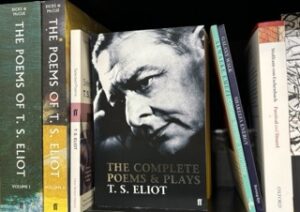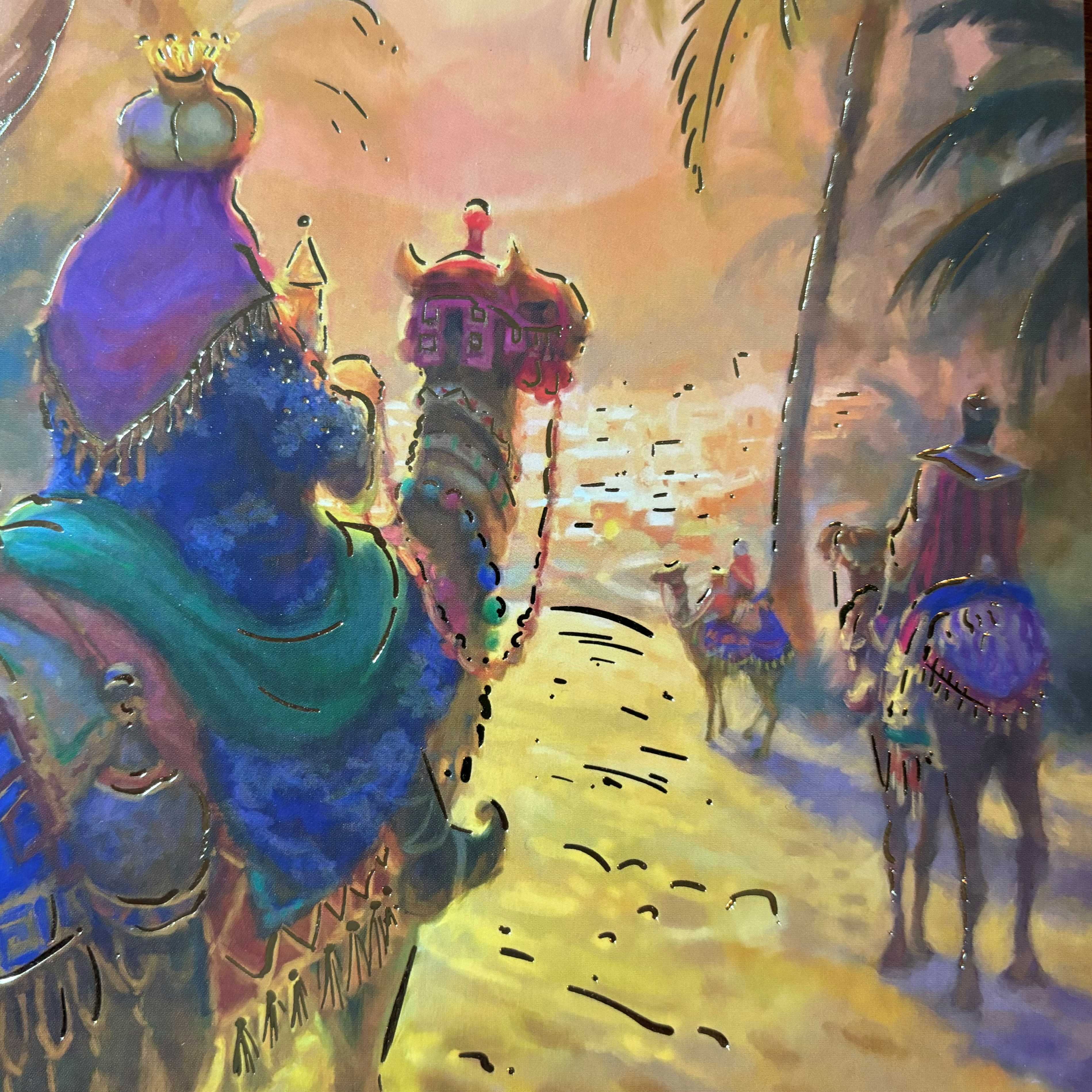Let’s dive into the “Journey of the Magi” and explore how the wise men experience alienation and disillusionment. Initially, I was introduced to Eliot’s poetry when I was given the poem “The Wasteland” to read at eighteen. Indeed, it was a complex poem to begin with. The influential modernist work uses fragmented structures and multiple voices of alienation and disillusionment. Moreover, it portrays a fractured post-World War 1 society. It was a society grappling with the loss of meaning and connection. Consequently, I was immediately drawn into T.S. Eliot’s poetry, and it wasn’t long before I discovered “The Journey of the Magi”.
The Guardian listed “The Journey of the Magi“ as one of the top ten Christmas poems. Whilst most of us are familiar with the story of The Three Wise from the nativity play, Eliot’s poem offers a deeper exploration. According to The Gospel of Matthew (2: 1-12), they travelled from the East to Bethlehem, specifically following a star in search of the newborn king. Furthermore, the poem digs deep into the psychological and spiritual turmoil the Magi went through in their epic journey.
Before continuing, let’s first take a listen to this beautiful recording of the poem.
JOURNEYS AND ALIENATION
Now, let’s delve deeper into the poem! First and foremost, the Magi in this poem experience profound alienation and disillusionment. In particular, they’re on an epic journey through harsh conditions. Throughout the poem, Eliot paints a brutal trek through landscapes with “the ways deep and the weather sharp”. Imagine their dedication to travelling for weeks in the freezing winter landscape. It’s not just another poem about three wise men bringing gifts to baby Jesus. By following the star, they are leaving behind a land they knew and their old beliefs and ways of life. However, it’s not their physical alienation I want to focus on – it’s their spiritual and emotional one. They’re leaving behind everything they know, their old ways of life and beliefs, to seek a new king. Undoubtedly, this has to be very disorientating!
Have you ever moved to a new city or travelled to a different continent? Everything is different: the culture, the people and even the food. During this time, you find yourself longing for the comforts of home, just like the Magi who reminisce about ” the summer palaces on the slopes, the terraces, and they silken girls bringing sherbet”.
DISPLACEMENT AND DISILLUSIONMENT
Nevertheless, the Magi aren’t just suffering homesickness. They’re experiencing a profound sense of displacement and disillusionment. Although they’re no longer home in their old world, they’re not quite home in their new one either. Essentially, they’re caught between two realities. One of the most poignant lines in the poem is when the narrator says, “we returned to our palaces, these kingdoms, But no longer at ease here, in the old dispensation”. Ultimately, The Magi could not return to their old life and pretend everything was the same.
I know I felt something similar after spending several months travelling through India and Pakistan—eye-opening places. When I came back, everything felt…off. Suddenly, I thought I had outgrown my old life, but I wasn’t quite sure how I fit in with the new perspective I’d gained.
THE MAGI’S DISILLUSIONMENT
Now, let’s consider the disillusionment the magi experienced. While they’ve travelled all the way, what exactly were they expecting? Interestingly, the poem is vague about their expectations, but we get the sense they were expecting something grand and miraculous. Instead, they find a “temperate valley” and a rather ordinary birth.
For the Magi, this disillusionment becomes even more profound. Despite witnessing the birth of a new era, they’re left with a sense of loss instead of joy or triumph. Specifically, in the poem, the narrator says, “I have seen birth and death, But had thought they were different”. It’s like they have glimpsed a beautiful and terrifying truth, and now they can’t unsee it. The Magi have seen Christ’s birth, symbolising the death of their old world and beliefs. Therefore, isn’t it any wonder they’re feeling a bit shell-shocked?
One thing that jumps out is how Eliot portrays this epic journey as a kind of death when the narrator says, “I should be glad of another death“. It’s like the Magi are experiencing a spiritual death, the end of their old selves and way of life. Indeed, this is a transformation we don’t expect to be easy.
So, what can we take away from this? First and foremost, Eliot’s poem reveals that spiritual journeys and personal transformations are often messy, confusing, and even painful. The Magi’s experience of alienation and disillusionment isn’t a sign that they’ve failed or that their journey was pointless. Instead, it’s a necessary part of growth and transformation. The Magi found the Christ child in humble surroundings, not in a grand palace. Perhaps the most life-changing revelation came in a quiet, unassuming moment.
MIGRATION AND ALIENATION TODAY
Furthermore, this poem speaks to the universal human feeling of being caught between worlds. For instance, migrants in the UK today face challenges similar to those of the Magi. One of the biggest challenges they face is alienation from the cultural differences when moving to a foreign country. Some of these challenges include learning a new language and adapting to living in a new city different from their own. The fear of the unknown can make this transition to a new environment almost impossible. As a result, they soon become disillusioned when gravitating towards urban slums, and their lack of negotiating power with potential employees makes them vulnerable.
We hear about the recent phenomenon of migrants crossing the English Channel in small boats. And even now, as I’m writing, the BBC has announced that “Five migrants die trying to cross English Channel in boat“. This raises the question, what do these migrants have in common with the Magi?
To begin with, hundreds and thousands of migrants flee their home countries out of desperation because of conflict and lack of economic stability. Additionally, they travel without visas or documentation, often travelling secretly to avoid the attention of the authorities. At the same time, migrants face an arduous journey, frequently being detained in centres in Libya and risking their lives to cross the perilous Mediterranean Sea. What’s more, they cross these seas in poorly designed and overcrowded boats despite the weather conditions, often leading to fatalities. Similar to the Magi, the long and arduous journey takes its toll on emotions, leaving both the
COMPARATIVE PERSPECTIVES ON ALIENATION
In conclusion, the Magi also experienced disillusionment when they questioned, “were we led all that way for Birth or Death?“ They are uncertain about the significance of their journey and the change it will bring to their lives. Throughout their journey, they wrestle with faith and beliefs as they witness the birth of Jesus and the changes it will bring to their lives. This disaffection leads to emotional stress, leaving them physically and emotionally drained. Although the Magi were “no longer at ease”, their changed values and experience challenged their previous understanding of the world. Nevertheless, this did not make their journey any more straightforward.
Finally, next time you feel a bit lost or have feelings of alienation and disillusionment, remember both the Magi and the recent migrants. After all, they have both travelled a long, hard road and faced disappointments and confusion. For anyone experiencing feelings of alienation, several resources can help:
- Campaign to EndLoneliness: Support organisations
- Healthline: Information on alienation’s symptoms and causes
Ultimately, the poem invites us to empathise with those navigating significant life transitions, recognising the complexity of human experience across different contexts and times.
Did you enjoy reading about alienation and disillusionment? If so, I’ve written a companion piece on isolation and depression where I unpack even more insights in my blog post, Isolation And Depression In The Lonely Protagonist Eileen, by Ottessa Moshfegh.
POEMS FEATURING ALIENATION AND DISILLUSIONMENT
Why are these poems important? First and foremost, they portray a man’s descent into isolation and madness as he’s haunted by grief over lost love. Moreover, they explore spiritual emptiness and cultural fragmentation. They do this by delving into immigrant alienation and disillusionment with the British dream, showing the complex hopes and isolation of modern migrants.
“The Raven” by Edgar Allan Poe
 This poem explores the themes of grief, loss and the descent into madness. Specifically, the protagonist becomes increasingly obsessed with the mysterious raven. The narrative’s repetitive refrain, ‘nothing more’, can be interpreted as a haunting reminder of his despair. Moreover, the poem’s dark and eerie atmosphere in a ‘bleak December’ contributes to the sense of madness that pervades the narrative.
This poem explores the themes of grief, loss and the descent into madness. Specifically, the protagonist becomes increasingly obsessed with the mysterious raven. The narrative’s repetitive refrain, ‘nothing more’, can be interpreted as a haunting reminder of his despair. Moreover, the poem’s dark and eerie atmosphere in a ‘bleak December’ contributes to the sense of madness that pervades the narrative.
“The Waste Land“ by T.S. Eliot
 Eliot delves into the themes of alienation and disillusionment, reflecting the world post-World War 1 – a world in disarray. Specifically, ‘A heap of broken images’ portrays a world where individuals feel disconnected and spiritually empty. This modern landscape emphasises a breakdown of traditional values. Ultimately, this describes a fragmented society and individuals who feel alienated in this desolate landscape.
Eliot delves into the themes of alienation and disillusionment, reflecting the world post-World War 1 – a world in disarray. Specifically, ‘A heap of broken images’ portrays a world where individuals feel disconnected and spiritually empty. This modern landscape emphasises a breakdown of traditional values. Ultimately, this describes a fragmented society and individuals who feel alienated in this desolate landscape.
“Look We Have Coming To Dover!” by Daljit Nagra
Nagra explores themes of alienation and disillusionment through the perspective of the immigrants ‘stowed in the sea’. The poem captures individuals’ challenges and disorientation as they arrive in a new, unfamiliar land, described as ‘swarms’. This highlights the disconnect between their expectations and the reality of their situation.
INTERESTED IN READING MORE ABOUT ALIENATION AND DISILLUSIONMENT?
- Embracing Alienation: Why We Shouldn’t Try to Find Ourselves (Kindle Edition)
- A Year to Change Your Mind: Ideas from the Therapy Room to Help You Live Better
- Searching for Meaning: Idealism, Bright Minds, Disillusionment, and Hope (Third in a Series of See Jane Win(tm) Books)
- Smasher: A Story to Help Adolescents with Anger & Alienation. The Institute for Arts in Therapy & Education.
LOOKING TO ENHANCE YOUR READING EXPERIENCE?
- EMSHOI A5 Notebook – 21.4 x 14.5 cm Lined Journal with 256 Numbered Pages, 120gsm Thick Paper, Sticky Notes, 8 Perforated Sheets, Hardback Vegan Leather Notepad for Women
- SECELES 400ml Large Ceramic Coffee Mugs, 14Oz Handmade Kiln Change Glaze Porcelain Tea Cup for Office and Home, Large Handle, Microwave and Dishwasher Safe, Hot and Cold Drinking (Dark Green)
- Lastar LED Floor Lamp, Reading Standing Lamps with Remote and Touch Control for Living Room, Bedroom, Office with 4 Color Temperature & 5 Brightness Levels, 60 min Timer & Memory Function
These are items I highly recommend. If you purchase after clicking on one of my affiliate links, I will earn a bit of coffee ☕️ money, which I promise to enjoy while reading and researching for my next blog, continuing to support you on your journey. You do not pay a higher price! 😊
Subscribe To Our Newsletter
Welcome, and join me and a community of fellow book lovers!
As a thank you, when you sign up, I’ll also send you my personal reading list: a selection books, poems, plays and short stories that explore mental illness in all aspects of life.

